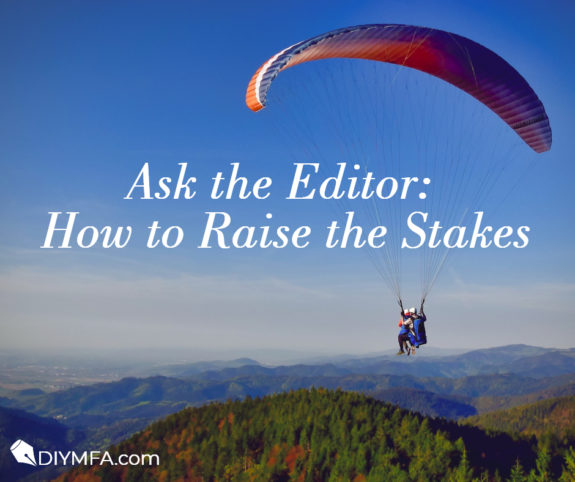I’m an indie fantasy romance author, and am currently in the revision process of my debut novel SPANK: Odyssey.
I keep reading online about readers not being invested in a story because the stakes are not high enough. I feel these people are saying your conflict isn’t interesting unless someone is at risk of dying or something.
My question is, is this true? Do I really need to up my stakes to the max, even though it wouldn’t really make sense in my story? Does someone’s life or the world need to be at stake in order for a story to be considered good?
Kind regards,
How Do I Raise the Stakes?
Dear HDIRtS,
When people say they’re not invested in a story because the stakes are not high enough, it’s possible they’re saying they’re not interested in a conflict unless the characters are at risk of death, blood, and world-ending mayhem. But depending on the type of story you’re writing, your stakes may not be tied to death, blood, and mayhem. Believe it or not, someone could write a story that includes explosions and the possible annihilation of the human race and still not have high enough stakes. Why? If your character doesn’t stand to lose anything by those events, then they don’t actually do anything to raise the stakes of the story.
So What Are The Stakes?
What readers likely mean when they say that the stakes aren’t high enough is that they can’t connect with what your character stands to lose if they fail to achieve the story’s goal. Your job as a writer is to show them why they should care about what happens, by showing them why your character cares.
So how do you identify your story’s stakes? Let’s take a look at your character’s goals and motivations to answer that question. Here are three questions you can ask to figure out the stakes in your story.
- Who or what does your character care about most? (motivation)
- What are they trying to achieve through the plot? (goal)
- What will happen if they do/don’t achieve their goal? (stakes)
The more clearly defined your answers to these three questions, the easier it will be to figure out when and how to raise the stakes in your story.
Much Ado About Nothing
Try to avoid setting your stakes too low. You have to convince your readers that the consequences of your character failing to achieve their goal matters to them. But more than that, you have to convince the reader that the consequences are something that could actually happen, and would be painful to endure. At the same time, don’t set your stakes at the highest they possibly could be at the beginning of the story. Your reader wants to know that your characters are going somewhere.
A good story arc includes a change in the motivation, the goal, or the stakes in order to keep the plot rolling forward. Sometimes the easiest way to show the stakes is to set a shortened time frame. The ticking clock naturally raises the stakes with each minute/hour/day that goes by. For example, in How To Lose A Guy In 10 Days, protagonist Andi Anderson has 10 days to meet a guy, get him to fall for her, and then get him to leave her (goal). If she does this she will earn prestige at her job (motivation). If she doesn’t do it, she may lose her job (stakes). When Andi realizes on Day 8 that what she wants most is to win Ben instead of lose him, the change in motivation and the limited timeframe raises the stakes: instead of worrying about losing her job, she’s afraid of losing someone she loves.
Reader Expectations
Whether the stakes of your story are high enough comes down to setting your reader’s expectations early in the story and then following through. Show your character’s wants, their needs, and what they’re risking in order to achieve those ends. If your character isn’t risking anything, your story’s arc will fall flat. But you don’t have to threaten to blow up the world in order to raise the stakes. You just have to threaten to blow up your character’s world.
How to “Ask the Editor”
Send your questions to ekauffman@writingrefinery.com. Limit yourself to a few paragraphs to introduce yourself and the problem at hand. “Brevity is the soul of wit,” after all. And keep an eye out for opportunities to send in longer submissions for critique.
 Elisabeth Kauffman is a freelance editor in California. Her favorite genres are YA fantasy, sci-fi, and romance. She regularly obsesses over board games, Doctor Who, and Harry Potter. Come share your ideas with her on Facebook and Twitter and on the web at www.writingrefinery.com. Also, check out her author website and her author page on Facebook.
Elisabeth Kauffman is a freelance editor in California. Her favorite genres are YA fantasy, sci-fi, and romance. She regularly obsesses over board games, Doctor Who, and Harry Potter. Come share your ideas with her on Facebook and Twitter and on the web at www.writingrefinery.com. Also, check out her author website and her author page on Facebook.







